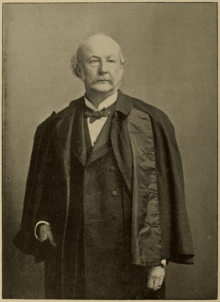Edward Windsor Richards
Edward Windsor Richards (August 1831 – 12 November 1921), known as Windsor Richards, was a British engineer, and steel maker.[1][2]

Life
Richards was born in Dowlais, and was educated at Monmouth and Christ’s Hospital. He was an apprentice at the Rhymney Iron and Steel Works. He studied the economy of utilizing the waste heat in blast furnace gases.[1]
Richards worked as assistant, and chief engineer of the Tredegar Iron Works. By 1871 he was general manager of the Ebbw Vale Iron Works, where he planned the Bessemer Steel Department.[1]
In 1875, Richards was General Manager of the Eston Ironworks of Bolckow Vaughan and Co, North Yorkshire. These included three hæmatite blast furnaces, and his work with Sidney Gilchrist Thomas contributed to the development of the Gilchrist-Thomas process.[1]
In 1884 he was awarded the Bessemer Gold Medal by the Council of the Iron and Steel Institute, for his work in steel manufacturing.[2]
In 1888, he worked on the manufacture of wrought iron, at the Low Moor Works south of Bradford. He retired in 1898.[1]
Richards was President of the Institution of Mechanical Engineers in 1896 and 1897, and was President of the Iron and Steel Institute, of which he was an Original Member, in 1894.
He was appointed a Deputy Lieutenant for Monmouthshire on 11 April 1902.[3]
References
- Presidents – 1896–1897: Edward Windsor Richards, Institute of Mechanical Engineers. Retrieved 16 January 2016.
- Wilkins, Charles (1903), History of the Iron, Steel, Tinplate and Other Trades of Wales, Cambridge University Press, pp. 201–2, ISBN 978-1-108-02693-2 (published digitally in 2011)
- "No. 27425". The London Gazette. 15 April 1902. p. 2511.
External links
| Professional and academic associations | ||
|---|---|---|
| Preceded by Alexander Blackie William Kennedy |
President of the Institution of Mechanical Engineers 1896–1897 |
Succeeded by Samuel Waite Johnson |